Franchising
Download as pptx, pdf0 likes1,155 views
Franchising involves a franchisor offering a franchisee the authorization to distribute, produce, and sell the franchisor's goods or services for a specified period. The franchisor provides brand positioning, knowledge, and technical assistance to the franchisee. There are advantages and disadvantages for both the franchisor and franchisee in the franchising relationship, which is governed by a contract outlining obligations for both parties such as use of trademarks, payment of royalties, and adherence to quality standards. Franchising allows for rapid business expansion using other parties' capital while providing small business owners recognition and support systems.
1 of 11
Downloaded 47 times
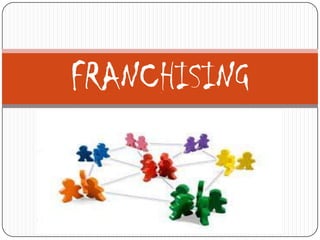

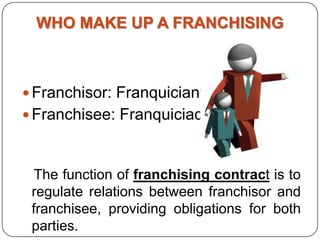
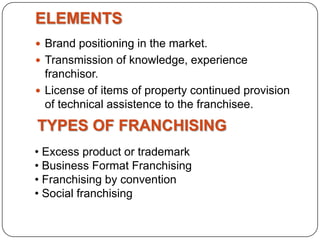
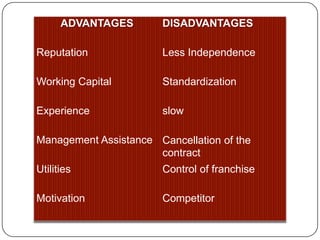
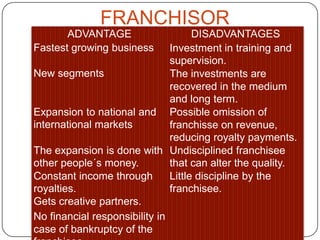
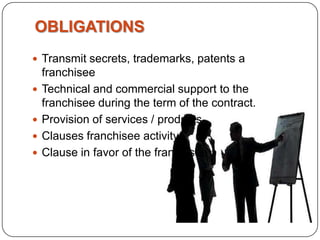

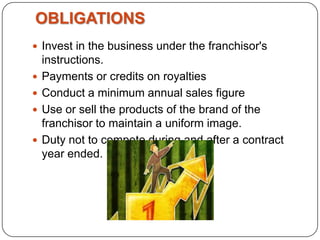
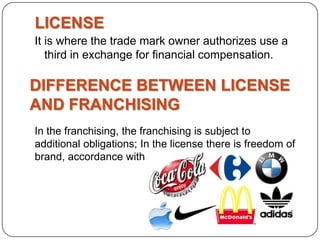

Ad
Recommended
Organic expansion
Organic expansionNaveen Sarpal
╠²
This document discusses franchising. It defines key terms like franchisor, franchisee, and franchise agreement. It explains that franchising allows a brand, business method, and marketing system to be shared. The two main types of franchising are product distribution franchises and business format franchises. It lists advantages for both franchisees and franchisors, such as established brands and business expansion, but also disadvantages like lack of freedom and communication challenges.Franchising
FranchisingPatricia Leyton
╠²
Franchising involves a franchisor offering a franchisee the authorization to distribute, produce, and sell the franchisor's goods and services for a specified period. The franchisor provides brand positioning, knowledge, and technical assistance to the franchisee. The franchising contract regulates the obligations of both parties. Franchising has advantages like established reputation and management assistance for franchisees, while providing expansion and income sources for franchisors. However, both parties also take on certain disadvantages like less independence and control issues.mehedi
mehediMehedi Hasan
╠²
Globalization presents challenges and opportunities through technology and new markets. Competing locally requires strategic insight to differentiate from established competitors. Franchising is a successful tactic that allows prosperity and growth by employing a proven business model and brand while providing training and support. However, challenges in Bangladesh include a lack of franchise laws and regulations, risks of quality issues and reputation harm for franchisors when terms are violated, and bureaucratic hurdles. Chicken King has achieved success in Bangladesh through niche positioning as the first halal fast food franchise, low costs, family friendly environment, and unique flavors that blend Western and local tastes.Franchising expo (1)
Franchising expo (1)Erikahernandez_24
╠²
Franchising involves a franchisor transferring their business expertise and experience to a franchisee in exchange for an initial fee and ongoing royalties. The franchisor provides their trademark, know-how, and ongoing support while the franchisee pays royalties based on sales and uses the franchisor's system and brand name. This arrangement allows the franchisor to expand their business with less capital while benefitting from the franchisee's marketing and sales efforts to strengthen their brand presence in the market. However, franchisees trade some independence for integration into an established commercial network.FRANCHISING & ITS TYPES
FRANCHISING & ITS TYPESRinu Thomas
╠²
Franchising involves allowing another business to use a company's successful business model, brand, and systems for a prescribed period in exchange for fees and royalties. There are three main types of franchises: business format franchises which provide an entire business model to franchisees like fast food restaurants; product franchises which allow retailers to sell a manufacturer's products; and manufacturing franchises which grant manufacturers the rights to produce and sell goods using a company's brand. Franchising provides benefits to both franchisors through rapid expansion with low capital investment, and franchisees through operating an established business with supported training and ongoing assistance.Chapter 6
Chapter 6detjen
╠²
Franchising involves semi-independent franchisees paying fees and royalties to a franchiser in exchange for using the franchiser's trademark, selling its products or services, and often using its business format and system. There are three main types of franchising: trade name franchising which allows use of the franchiser's name without exclusive product distribution; product distribution franchising which licenses franchisees to sell franchiser products under its brand name; and pure franchising which sells a complete business format and system. Some advantages of buying a franchise include management training and support, brand name appeal, and national advertising programs, while drawbacks include franchise fees and royalties, market saturation, and less business freedom.Franchising
FranchisingMAC_V
╠²
This document defines franchising as an arrangement where a franchisor grants a franchisee the right to use its trademark, trade name, business systems, and processes. Some key advantages of franchising include immediate name recognition, tried and tested products and business models, standardized operations, employee training, and reduced risk. However, franchising also means sharing profits with other franchisees and losing some independence. The franchise contract and transmission of know-how are important characteristics. Different types of franchising exist based on the rights granted, business sector, and level of knowledge transferred.Ten key provisions of franchise agreements
Ten key provisions of franchise agreementsglob inc
╠²
The document outlines 10 key provisions that are generally covered in a franchise agreement: 1) Training and support provided by the franchisor, 2) The assigned territory for the franchisee, 3) The duration of the agreement, 4) Franchise fees and total anticipated investment, 5) Use of trademarks, patents and signage, 6) Royalties and other fees paid to the franchisor, 7) Advertising requirements and fees, 8) Operating protocols for franchisees, 9) Renewal rights and termination policies, and 10) The franchisee's rights to resell the franchise.Franchising
Franchising Erikahernandez_24
╠²
Franchising involves a franchisor transferring their business expertise and experience to a franchisee in exchange for an initial fee and ongoing royalties. The franchisor provides their trademark, know-how, and ongoing support while the franchisee pays royalties based on sales and uses the franchisor's system and brand name. This allows the franchisor to expand their business with less capital while strengthening their brand presence, while the franchisee gains access to an established brand and business model. However, franchisees trade some independence for integration into a larger network and guaranteed brand recognition.HARI'S FRANCHISING PRESENTATION 3.pptx
HARI'S FRANCHISING PRESENTATION 3.pptxHariNarayan83
╠²
Franchising is a business model where a franchisor allows a franchisee to use its brand name, business model, and intellectual property in exchange for fees and ongoing royalties. The earliest franchising occurred in the 1850s with Singer sewing machines. Later, companies like McDonald's and Burger King expanded franchising significantly. There are different types of franchises including business format, product, dealership, and master franchises. Franchising offers benefits to both franchisors and franchisees such as brand recognition, proven business models, and economies of scale, but also challenges around coordinating semi-independent businesses and safeguarding both parties' interests.Franchising
FranchisingMAC_V
╠²
This document defines franchising as an arrangement where a franchisor grants a franchisee the right to use its trademark, trade name, business systems, and processes. Some key advantages of franchising include immediate name recognition, tried and tested products and business models, standardized operations, employee training, and reduced risk. However, franchising also means sharing profits with other franchisees and losing some independence. The franchise contract and transmission of know-how are important characteristics. Different types of franchising exist based on the rights granted, business sector, and level of knowledge transferred.Chapter 3 - PPTisks as "entrepreneurship"..pptx
Chapter 3 - PPTisks as "entrepreneurship"..pptxahmed5156
╠²
The document discusses franchising as a significant aspect of entrepreneurship, highlighting its economic impact in the U.S. with over 757,000 outlets generating $802 billion annually. It covers the benefits and drawbacks of buying a franchise, types of franchising, and important considerations for potential franchisees, including the necessity of a Franchise Disclosure Document (FDD). Additionally, it outlines trends in franchising and strategies for entrepreneurs to establish successful franchise operations.Franchising
FranchisingSri Venkateswara College, University of Delhi
╠²
The document provides an introduction to franchising. It defines franchising as an arrangement where a franchisor grants rights and authorities to a franchisee. The franchisor allows the franchisee to sell its products and use its brand name and trademarks in exchange for an upfront fee and ongoing royalty payments. Some advantages for franchisees are reduced risk and training provided, while franchisors benefit from expanded market reach without additional costs.Wipo Smes Kul 08 Topic01
Wipo Smes Kul 08 Topic01Sankaran Adersh S
╠²
Franchising has grown significantly since the mid-19th century with brands like Ford, Shell, and McDonald's. It allows franchisors to expand more quickly while providing franchisees with established business systems and brand names. There are three main types: product distribution, business format, and management franchises. Franchising is important for small businesses as it provides economies of scale, standardized quality, and a proven business model. Both franchisors and franchisees must carefully consider factors like support provided, rights and obligations, and financial viability. Overall, franchising can be a successful business strategy when both parties enter with proper preparation and legal protections.International Business - licensing and franchising
International Business - licensing and franchisingKhyatiTongia
╠²
The document discusses licensing and franchising. It defines licensing as an agreement where a licensor grants a licensee access to patents, trademarks, or technology for a fee. Franchising is defined as an agreement where a franchisor allows a franchisee to use its brand name and logo to provide similar goods and services, while requiring the franchisee follow certain quality standards. The document outlines the key elements, advantages, and disadvantages of both licensing and franchising agreements. Examples of well-known licensed and franchised brands are also provided, as well as a comparison of the differences between licensing and franchising.Franchise [compatibility mode]
Franchise [compatibility mode]Delwin Arikatt
╠²
The plaintiff Ravissant Pvt Ltd entered into franchise agreements with the defendant D.F. Export S.A. in 2000 and 2002 to operate hair salons in New Delhi and Mumbai respectively under the brand 'Jacques Dessange'. In 2003, the parties agreed to a master franchise agreement allowing the plaintiff to open additional salons in other cities. The plaintiff incurred costs to prepare for new salons based on this agreement. However, in 2004 the defendant informed the plaintiff it would cancel the Delhi salon agreement upon expiration and wanted to modify terms for future agreements, going against the original master franchise agreement. This led to a legal dispute between the parties.Presen Waralaba.ppt
Presen Waralaba.pptEDDYPURNOMO19
╠²
This document provides information about franchises and licenses. It begins by defining a franchise as buying someone else's complete business package, including equipment, materials, procedures, consulting rights, and a license to use the business' trademark. A franchise is based on a written agreement between the franchisor and franchisee.
The document then discusses the legal basis for franchising and licensing in Indonesia. It provides definitions and characteristics of franchises and licenses. Key differences are outlined, such as franchises focusing on providing services while licenses deal with products. Examples of major franchise and license companies operating in Indonesia, such as McDonald's and Domino's, are also mentioned.Franchising
FranchisingAjilal
╠²
This document discusses franchising. It defines franchising as granting the right to use a business's model and brand for a set period of time. The key parties in franchising are the franchisor, who owns the business model, and the franchisee, who pays fees to use the franchisor's brand. There are advantages for both parties: franchisees gain an established brand and business support, while franchisors can expand their business with less capital and risk. The document outlines the types of franchising and perspectives of both franchisors and franchisees.Franchising
FranchisingIndira
╠²
This document discusses franchising. It defines franchising as granting the right to use a business's model and brand for a set period of time. The key parties in franchising are the franchisor, who owns the business model, and the franchisee, who pays fees to use the franchisor's brand. There are advantages for both parties: franchisees gain an established brand and business support, while franchisors can expand their business with less capital and risk through the franchisee system.Franchising
Franchisingaygun9
╠²
The document discusses the history and types of franchising. It began in Germany in 1851 when Singer Sewing Machine Co. began granting distribution franchises. There are several types of franchises including business format franchises, product or trade name franchises, dealerships, and unit franchises. The franchisor grants the franchisee rights to use its business system and sell its products/services in exchange for fees and royalties. While franchising provides benefits like name recognition and marketing support, it also has disadvantages such as high fees and restrictions.Franchising
Franchisingaygun9
╠²
The document discusses the history and types of franchising. It began in 1851 when Singer Sewing Machine Co. began granting distribution franchises. A franchise involves a franchisor licensing a franchisee the right to make and sell the franchisor's goods/services under their brand name. Common types of franchises include business format franchises, product/trade name franchises, dealerships, and unit franchises. While franchising provides benefits like name recognition and marketing support, it also involves disadvantages such as high fees and costs.franshiza.ppt
franshiza.pptMaxbuba
╠²
This document discusses franchising. It defines franchising as a contractual relationship between a franchisor and franchisee where the franchisor provides ongoing support to the franchisee's business in areas like training and know-how. The franchisee operates under the franchisor's brand and format. Franchising began in the late 1800s and has grown significantly with brands like McDonald's and Starbucks. There are three main types of franchising: product distribution, business format, and management. Franchising provides benefits to franchisees like an established brand, business support, and economies of scale. Prospective franchisees must carefully review agreements and ensure franchising is a good fit for their market.Presentation on franchise
Presentation on franchisesatarupa modak
╠²
A franchise is an agreement that allows a person (franchisee) to use a business's (franchisor) name, products, and operating methods. There are two main types of franchises: product distribution franchises focus on selling the franchisor's products, while business format franchises provide a complete business model. Franchise agreements can be for a single unit or allow multi-unit development. Franchises offer advantages like established brands, support systems, and increased success chances, but also disadvantages like ongoing fees, less independence, and shared brand reputation risks.wipo_smes_uln_07_www_89152.ppt
wipo_smes_uln_07_www_89152.pptFaisalRafique27
╠²
Franchising is an important means of entrepreneurship, particularly for small and medium enterprises. In the United States, franchising accounts for 10% of the private sector economy and 50% of retail sales, directly employing over 10 million people. In Europe, franchising also has significant economic impact, with over 8,860 franchise brands across 20 countries. In the UK specifically, franchising contributes over £10 billion annually to the economy through over 35,000 outlets employing over 370,000 workers. Franchising provides a way for small businesses to benefit from an established brand and operating system while maintaining independence.Franchising
FranchisingAamera Khan
╠²
The document discusses franchising start-up packages which provide services like market surveys, facility design, financing advice, operating manuals, management training, and employee training. It also defines franchising as a business arrangement where a franchisor allows a franchisee to use its brand name and business model in exchange for fees. The roles of franchisors and franchisees are outlined, along with ongoing benefits franchisors provide and advantages and disadvantages of franchising.Intro To Franchise
Intro To FranchiseJacOng1
╠²
The document discusses franchising, defining it as an agreement between two legally independent parties - the franchisee and franchisor. It gives the franchisee the right to use the franchisor's trademark and operate using its methods, in exchange for fees. The document outlines the advantages of franchising such as an established brand, support services, and increased chances of success. It also notes potential disadvantages like less independence and responsibility for system-wide problems.What is franchising and why it is important
What is franchising and why it is important Monica Smith
╠²
Franchising involves a relationship where a franchisor grants a franchisee the right to operate under their brand, and it is crucial for rapid and cost-effective business expansion. The document outlines the types, benefits, and steps for franchising, emphasizing faster growth with less capital and increased brand awareness. Additionally, potential franchisees should understand the franchise agreement guidelines and consider it as a low-cost means to expand their small business.Tesia Dobrydnia - A Leader In Her Industry
Tesia Dobrydnia - A Leader In Her IndustryTesia Dobrydnia
╠²
Tesia Dobrydnia brings her many talents to her career as a chemical engineer in the oil and gas industry. With the same enthusiasm she puts into her work, she engages in hobbies and activities including watching movies and television shows, reading, backpacking, and snowboarding. She is a Relief Senior Engineer for Chevron and has been employed by the company since 2007. Tesia is considered a leader in her industry and is known to for her grasp of relief design standards. BMGI India Addressing Strategic, Innovative, and Operational Problems at Core...
BMGI India Addressing Strategic, Innovative, and Operational Problems at Core...Naresh Raisinghani
╠²
Discover how BMGI India empowers businesses to solve core challenges, drive sustainable growth, and achieve real transformation through proven frameworks and deep industry expertise.
https://www.bmgindia.comMore Related Content
Similar to Franchising (20)
Franchising
Franchising Erikahernandez_24
╠²
Franchising involves a franchisor transferring their business expertise and experience to a franchisee in exchange for an initial fee and ongoing royalties. The franchisor provides their trademark, know-how, and ongoing support while the franchisee pays royalties based on sales and uses the franchisor's system and brand name. This allows the franchisor to expand their business with less capital while strengthening their brand presence, while the franchisee gains access to an established brand and business model. However, franchisees trade some independence for integration into a larger network and guaranteed brand recognition.HARI'S FRANCHISING PRESENTATION 3.pptx
HARI'S FRANCHISING PRESENTATION 3.pptxHariNarayan83
╠²
Franchising is a business model where a franchisor allows a franchisee to use its brand name, business model, and intellectual property in exchange for fees and ongoing royalties. The earliest franchising occurred in the 1850s with Singer sewing machines. Later, companies like McDonald's and Burger King expanded franchising significantly. There are different types of franchises including business format, product, dealership, and master franchises. Franchising offers benefits to both franchisors and franchisees such as brand recognition, proven business models, and economies of scale, but also challenges around coordinating semi-independent businesses and safeguarding both parties' interests.Franchising
FranchisingMAC_V
╠²
This document defines franchising as an arrangement where a franchisor grants a franchisee the right to use its trademark, trade name, business systems, and processes. Some key advantages of franchising include immediate name recognition, tried and tested products and business models, standardized operations, employee training, and reduced risk. However, franchising also means sharing profits with other franchisees and losing some independence. The franchise contract and transmission of know-how are important characteristics. Different types of franchising exist based on the rights granted, business sector, and level of knowledge transferred.Chapter 3 - PPTisks as "entrepreneurship"..pptx
Chapter 3 - PPTisks as "entrepreneurship"..pptxahmed5156
╠²
The document discusses franchising as a significant aspect of entrepreneurship, highlighting its economic impact in the U.S. with over 757,000 outlets generating $802 billion annually. It covers the benefits and drawbacks of buying a franchise, types of franchising, and important considerations for potential franchisees, including the necessity of a Franchise Disclosure Document (FDD). Additionally, it outlines trends in franchising and strategies for entrepreneurs to establish successful franchise operations.Franchising
FranchisingSri Venkateswara College, University of Delhi
╠²
The document provides an introduction to franchising. It defines franchising as an arrangement where a franchisor grants rights and authorities to a franchisee. The franchisor allows the franchisee to sell its products and use its brand name and trademarks in exchange for an upfront fee and ongoing royalty payments. Some advantages for franchisees are reduced risk and training provided, while franchisors benefit from expanded market reach without additional costs.Wipo Smes Kul 08 Topic01
Wipo Smes Kul 08 Topic01Sankaran Adersh S
╠²
Franchising has grown significantly since the mid-19th century with brands like Ford, Shell, and McDonald's. It allows franchisors to expand more quickly while providing franchisees with established business systems and brand names. There are three main types: product distribution, business format, and management franchises. Franchising is important for small businesses as it provides economies of scale, standardized quality, and a proven business model. Both franchisors and franchisees must carefully consider factors like support provided, rights and obligations, and financial viability. Overall, franchising can be a successful business strategy when both parties enter with proper preparation and legal protections.International Business - licensing and franchising
International Business - licensing and franchisingKhyatiTongia
╠²
The document discusses licensing and franchising. It defines licensing as an agreement where a licensor grants a licensee access to patents, trademarks, or technology for a fee. Franchising is defined as an agreement where a franchisor allows a franchisee to use its brand name and logo to provide similar goods and services, while requiring the franchisee follow certain quality standards. The document outlines the key elements, advantages, and disadvantages of both licensing and franchising agreements. Examples of well-known licensed and franchised brands are also provided, as well as a comparison of the differences between licensing and franchising.Franchise [compatibility mode]
Franchise [compatibility mode]Delwin Arikatt
╠²
The plaintiff Ravissant Pvt Ltd entered into franchise agreements with the defendant D.F. Export S.A. in 2000 and 2002 to operate hair salons in New Delhi and Mumbai respectively under the brand 'Jacques Dessange'. In 2003, the parties agreed to a master franchise agreement allowing the plaintiff to open additional salons in other cities. The plaintiff incurred costs to prepare for new salons based on this agreement. However, in 2004 the defendant informed the plaintiff it would cancel the Delhi salon agreement upon expiration and wanted to modify terms for future agreements, going against the original master franchise agreement. This led to a legal dispute between the parties.Presen Waralaba.ppt
Presen Waralaba.pptEDDYPURNOMO19
╠²
This document provides information about franchises and licenses. It begins by defining a franchise as buying someone else's complete business package, including equipment, materials, procedures, consulting rights, and a license to use the business' trademark. A franchise is based on a written agreement between the franchisor and franchisee.
The document then discusses the legal basis for franchising and licensing in Indonesia. It provides definitions and characteristics of franchises and licenses. Key differences are outlined, such as franchises focusing on providing services while licenses deal with products. Examples of major franchise and license companies operating in Indonesia, such as McDonald's and Domino's, are also mentioned.Franchising
FranchisingAjilal
╠²
This document discusses franchising. It defines franchising as granting the right to use a business's model and brand for a set period of time. The key parties in franchising are the franchisor, who owns the business model, and the franchisee, who pays fees to use the franchisor's brand. There are advantages for both parties: franchisees gain an established brand and business support, while franchisors can expand their business with less capital and risk. The document outlines the types of franchising and perspectives of both franchisors and franchisees.Franchising
FranchisingIndira
╠²
This document discusses franchising. It defines franchising as granting the right to use a business's model and brand for a set period of time. The key parties in franchising are the franchisor, who owns the business model, and the franchisee, who pays fees to use the franchisor's brand. There are advantages for both parties: franchisees gain an established brand and business support, while franchisors can expand their business with less capital and risk through the franchisee system.Franchising
Franchisingaygun9
╠²
The document discusses the history and types of franchising. It began in Germany in 1851 when Singer Sewing Machine Co. began granting distribution franchises. There are several types of franchises including business format franchises, product or trade name franchises, dealerships, and unit franchises. The franchisor grants the franchisee rights to use its business system and sell its products/services in exchange for fees and royalties. While franchising provides benefits like name recognition and marketing support, it also has disadvantages such as high fees and restrictions.Franchising
Franchisingaygun9
╠²
The document discusses the history and types of franchising. It began in 1851 when Singer Sewing Machine Co. began granting distribution franchises. A franchise involves a franchisor licensing a franchisee the right to make and sell the franchisor's goods/services under their brand name. Common types of franchises include business format franchises, product/trade name franchises, dealerships, and unit franchises. While franchising provides benefits like name recognition and marketing support, it also involves disadvantages such as high fees and costs.franshiza.ppt
franshiza.pptMaxbuba
╠²
This document discusses franchising. It defines franchising as a contractual relationship between a franchisor and franchisee where the franchisor provides ongoing support to the franchisee's business in areas like training and know-how. The franchisee operates under the franchisor's brand and format. Franchising began in the late 1800s and has grown significantly with brands like McDonald's and Starbucks. There are three main types of franchising: product distribution, business format, and management. Franchising provides benefits to franchisees like an established brand, business support, and economies of scale. Prospective franchisees must carefully review agreements and ensure franchising is a good fit for their market.Presentation on franchise
Presentation on franchisesatarupa modak
╠²
A franchise is an agreement that allows a person (franchisee) to use a business's (franchisor) name, products, and operating methods. There are two main types of franchises: product distribution franchises focus on selling the franchisor's products, while business format franchises provide a complete business model. Franchise agreements can be for a single unit or allow multi-unit development. Franchises offer advantages like established brands, support systems, and increased success chances, but also disadvantages like ongoing fees, less independence, and shared brand reputation risks.wipo_smes_uln_07_www_89152.ppt
wipo_smes_uln_07_www_89152.pptFaisalRafique27
╠²
Franchising is an important means of entrepreneurship, particularly for small and medium enterprises. In the United States, franchising accounts for 10% of the private sector economy and 50% of retail sales, directly employing over 10 million people. In Europe, franchising also has significant economic impact, with over 8,860 franchise brands across 20 countries. In the UK specifically, franchising contributes over £10 billion annually to the economy through over 35,000 outlets employing over 370,000 workers. Franchising provides a way for small businesses to benefit from an established brand and operating system while maintaining independence.Franchising
FranchisingAamera Khan
╠²
The document discusses franchising start-up packages which provide services like market surveys, facility design, financing advice, operating manuals, management training, and employee training. It also defines franchising as a business arrangement where a franchisor allows a franchisee to use its brand name and business model in exchange for fees. The roles of franchisors and franchisees are outlined, along with ongoing benefits franchisors provide and advantages and disadvantages of franchising.Intro To Franchise
Intro To FranchiseJacOng1
╠²
The document discusses franchising, defining it as an agreement between two legally independent parties - the franchisee and franchisor. It gives the franchisee the right to use the franchisor's trademark and operate using its methods, in exchange for fees. The document outlines the advantages of franchising such as an established brand, support services, and increased chances of success. It also notes potential disadvantages like less independence and responsibility for system-wide problems.What is franchising and why it is important
What is franchising and why it is important Monica Smith
╠²
Franchising involves a relationship where a franchisor grants a franchisee the right to operate under their brand, and it is crucial for rapid and cost-effective business expansion. The document outlines the types, benefits, and steps for franchising, emphasizing faster growth with less capital and increased brand awareness. Additionally, potential franchisees should understand the franchise agreement guidelines and consider it as a low-cost means to expand their small business.Recently uploaded (20)
Tesia Dobrydnia - A Leader In Her Industry
Tesia Dobrydnia - A Leader In Her IndustryTesia Dobrydnia
╠²
Tesia Dobrydnia brings her many talents to her career as a chemical engineer in the oil and gas industry. With the same enthusiasm she puts into her work, she engages in hobbies and activities including watching movies and television shows, reading, backpacking, and snowboarding. She is a Relief Senior Engineer for Chevron and has been employed by the company since 2007. Tesia is considered a leader in her industry and is known to for her grasp of relief design standards. BMGI India Addressing Strategic, Innovative, and Operational Problems at Core...
BMGI India Addressing Strategic, Innovative, and Operational Problems at Core...Naresh Raisinghani
╠²
Discover how BMGI India empowers businesses to solve core challenges, drive sustainable growth, and achieve real transformation through proven frameworks and deep industry expertise.
https://www.bmgindia.comChapter 1 Introduction to Accountin1.6 plusone class first chapter (1) (1).pptx
Chapter 1 Introduction to Accountin1.6 plusone class first chapter (1) (1).pptxdilshap23
╠²
introduction to accountingHow Effective Leadership Drives Success and Accelerates Business Growth by De...
How Effective Leadership Drives Success and Accelerates Business Growth by De...Devin Doyle
╠²
As defined by Devin Doyle, Leadership plays a pivotal role in driving the success and growth of any business. A strong leader sets the tone for the entire organization, inspiring teams and aligning efforts toward achieving the companyÔÇÖs goals. Leadership is more than just directing operations; itÔÇÖs about empowering people, fostering innovation, and creating a positive work environment that propels business growthOleksandr Osypenko: ðúð┐ÐÇð░ð▓ð╗Ðûð¢ð¢ÐÅ Ðçð░Ðüð¥ð╝ Ðéð░ ÐÇðÁÐüÐâÐÇÐüð░ð╝ð© (UA)
Oleksandr Osypenko: ðúð┐ÐÇð░ð▓ð╗Ðûð¢ð¢ÐÅ Ðçð░Ðüð¥ð╝ Ðéð░ ÐÇðÁÐüÐâÐÇÐüð░ð╝ð© (UA)Lviv Startup Club
╠²
Oleksandr Osypenko: ðúð┐ÐÇð░ð▓ð╗Ðûð¢ð¢ÐÅ Ðçð░Ðüð¥ð╝ Ðéð░ ÐÇðÁÐüÐâÐÇÐüð░ð╝ð© (UA)
LemBS PMP Prep Course
Website ÔÇô https://lembs.com/pmpcourse
Youtube ÔÇô https://www.youtube.com/startuplviv
FB ÔÇô https://www.facebook.com/pmdayconferenceWebinar: Why Odoo is a game-changer for Service Companies
Webinar: Why Odoo is a game-changer for Service Companiesdear digital
╠²
Watch the webinar: https://youtu.be/49xUiOHJwa4
Running a service business? Then you know how messy operations can get.
YouÔÇÖre not selling products. YouÔÇÖre selling time, expertise, and client satisfaction. That means your tools need to handle projects, people, planning, and billing - all in one place.
ThatÔÇÖs exactly where Odoo shines. Unlike traditional ERP systems, Odoo is built to support the unique workflows of service companies. From managing projects and tracking time to invoicing, signing contracts, and handling support tickets: Odoo brings everything together. No more jumping between a plethora of spreadsheets, tools, and inboxes.
With over 45 modules, Odoo grows with your business. Need CRM today, Helpdesk tomorrow? No worries, itÔÇÖs all connected. Plus, itÔÇÖs fully customizable to match the way your company works.
Wondering if itÔÇÖs a fit?
Join our 1-hour webinar where our Odoo expert Julien will walk you through the power of Odoo for service companies, complete with real-life examples from companies like yours!
What youÔÇÖll learn:
 How Odoo streamlines the entire service lifecycle
 Key modules for service businesses: Project, Timesheets, CRM, Invoicing & more
 How reporting works within Odoo
 What makes Odoo different from other ERP systems
 When Odoo is a fit for your company (and when it's not)
 A demo where we guide you through the possibilities step-by-step
Noah Loul Shares 5 Key Impacts of AI Agents on the Sales Industry
Noah Loul Shares 5 Key Impacts of AI Agents on the Sales IndustryNoah Loul
╠²
Noah Loul is the CEO of AI Agents by B2B Rocket, a company dedicated to transforming how sales teams operate using AI. With a clear and practical approach, Noah Loul is creating tools that help businesses respond quickly, qualify leads more effectively, and close more deals. He believes technology should support people, not replace them, and his work helps sales teams accomplish more with less effort. Noah Loul shares five straightforward ways AI agents are changing the way sales teams work and helping businesses boost their sales.Rushi Manche | Blockchain Tech Company Co-Founder
Rushi Manche | Blockchain Tech Company Co-FounderRushi Manche
╠²
Rushi Manche has received recognition for his academic, entrepreneurial, and public service achievements at the state, national, and international levels. His contributions span a variety of disciplines, including finance, technology, and education.What Drives Collectors in Sports and Beyond, and How Mantel is Bringing Them ...
What Drives Collectors in Sports and Beyond, and How Mantel is Bringing Them ...Neil Horowitz
╠²
On episode 2947of the Digital and Social Media Sports Podcast, Neil chatted with Evan Parker, CEO of Mantel.
What follows is a collection of snippets from the podcast. To hear the full interview and more, check out the podcast on all podcast platforms and at www.dsmsports.net.The Science Behind Effective Lead Nurture Programs in B2B Marketing.pptx
The Science Behind Effective Lead Nurture Programs in B2B Marketing.pptxbrandonsoros91
╠²
In a crowded B2B marketplace, a purpose-built lead nurture program has moved beyond jargon itÔÇÖs functions as a methodical system for earning trust, educating buyers, and lifting conversion rates at every stage at the sales funnel. The Strategic Landscape of EssarÔÇÖs CSR Initiatives in 2024
The Strategic Landscape of EssarÔÇÖs CSR Initiatives in 2024essarupdate
╠²
The Essar Group, a diversified conglomerate with interests spanning energy, infrastructure, metals & mining, ports, steel and construction, technology and retail, has long been a leader in corporate philanthropy. The companyÔÇÖs Corporate Social Responsibility (CSR) arm ÔÇö Essar Foundation is an independent identity, working to strengthen the groupÔÇÖs vision for an equitable and sustainable world. Over the last 50 years, Essar Foundation has worked closely with communities at the grassroots to address local social, economic, and environmental issues.Essar 2.0 Rising with a New Approach.pptx
Essar 2.0 Rising with a New Approach.pptxessarupdate
╠²
The Essar Group, one of the leading players in the countryÔÇÖs corporate landscape, recognised for its extensive investments and innovative projects, had a challenging phase in the late 2000s and early 2010s. The company was burdened with Essar Insolvency and debt repayments and thus had to sell few of its assets to strengthen its balance sheet. It later underwent a major transformation by adopting a new business model that is focused on asset-light operations. Though the new Essar is a smaller company than the old one, it is a much more focused and agile company. With a revenue of USD 15 billion, and Assets Under Management (AUM) of USD 9.6 billion Essar is well-positioned for future opportunities.QuickBooks Keeps Freezing: Causes & Solutions.pptx
QuickBooks Keeps Freezing: Causes & Solutions.pptxrobastwilliams
╠²
QuickBooks freezing refers to a situation where the accounting software becomes unresponsive during use. This can occur while opening files, saving data, or performing tasks. ItÔÇÖs often caused by outdated software, corrupted files, limited system resources, or software conflicts, disrupting workflow and requiring troubleshooting to restore normal performance.Power of the Many Masterclasses - 2nd draft .pptx
Power of the Many Masterclasses - 2nd draft .pptxAlexBausch2
╠²
Masterclass on digitalisation of Energy SystemsMarketing Assignment presentation of good marketing techniques how to impleme...
Marketing Assignment presentation of good marketing techniques how to impleme...Priya Raj
╠²
Marketing presentationVaden Consultancy: Transforming Businesses with Integrated HR, IT, and Cloud ...
Vaden Consultancy: Transforming Businesses with Integrated HR, IT, and Cloud ...Vaden Consultancy
╠²
At Vaden Consultancy, we specialize in aligning talent, technology, and infrastructure to power business transformation. Our integrated service model brings together end-to-end HR consultancy, custom software development, and cloud infrastructure management ÔÇö enabling organizations to scale efficiently, adapt faster, and stay future-ready.
From sourcing top-tier talent and streamlining recruitment through RPO, to building enterprise-grade applications and deploying Microsoft 365, Azure, and Power Platform solutions ÔÇö we deliver a seamless experience under one roof. With expert support and strategic insight, we help businesses enhance productivity, reduce operational costs, and drive innovation at every level.
Vaden Consultancy is not just a service provider ÔÇö we are your strategic partner for growth in todayÔÇÖs digital-first economy. AX to Dynamics 365 Finance and Operations in USA.pdf
AX to Dynamics 365 Finance and Operations in USA.pdfTrident information system
╠²
Upgrading from Microsoft Dynamics AX to Dynamics 365 Finance & Supply Chain Management (D365 F&O) is not just a technology upgradeÔÇöitÔÇÖs a strategic move to transform your business. At Trident Information Systems, a trusted Microsoft Gold Partner, we specialize in Upgrade AX to D365 F&O implementations. With decades of ERP expertise, we ensure your migration journey is smooth, efficient, and delivers maximum ROI. Whether youÔÇÖre transitioning from AX to D365 F&O, we are here to make your digital transformation seamless and impactful.
Axcess Instruments Pitch Deck - Newport Beach Investor Conference 2025
Axcess Instruments Pitch Deck - Newport Beach Investor Conference 2025Hector Del Castillo, CPM, CPMM
╠²
Axcess Instruments Pitch Deck for Newport Beach Investor Conference 2025Electronic Shelf Labels & Digital Price Tags in Delhi | Foodcare
Electronic Shelf Labels & Digital Price Tags in Delhi | FoodcareFoodcare llp
╠²
Foodcare brings advanced electronic shelf labels and digital price tags to Delhi, transforming the way retailers manage pricing and product displays. Designed for modern retail environments, our solutions offer real-time price updates, reduce manual errors, and save operational time. These digital tags are ideal for supermarkets, grocery stores, pharmacies, and other retail formats looking to enhance efficiency and accuracy. With wireless connectivity and centralized control, you can update pricing, promotions, and product details instantly across multiple shelves. The high-contrast, energy-efficient displays ensure clear visibility for customers, improving overall shopping experience. Our labels are available in various sizes to suit different product categories and shelf designs. Easy to install and maintain, FoodcareÔÇÖs electronic shelf label systems provide a seamless upgrade to your storeÔÇÖs infrastructure. Choose Foodcare in Delhi for smart pricing solutions that combine innovation, reliability, and professional presentation. Stay competitive with digital technology that simplifies retail operations. For more information visithttps://foodcare.co.in/electronic-price-tags-in-Delhi/BOURNS POTENTIOMETER Provide You Precision
BOURNS POTENTIOMETER Provide You Precisionsmidmart
╠²
Bourns potentiometers are high-quality variable resistors designed for precision control in a wide range of electronic applications. Known for their durability, accuracy, and reliability, Bourns potentiometers are ideal for adjusting signal levels, tuning circuits, or setting reference voltages in industrial, automotive, and consumer electronics.
Available in rotary and slide variants, these components offer excellent repeatability, smooth operation, and long mechanical life, making them a trusted choice for engineers and designers worldwide.
BMGI India Addressing Strategic, Innovative, and Operational Problems at Core...
BMGI India Addressing Strategic, Innovative, and Operational Problems at Core...Naresh Raisinghani
╠²
Axcess Instruments Pitch Deck - Newport Beach Investor Conference 2025
Axcess Instruments Pitch Deck - Newport Beach Investor Conference 2025Hector Del Castillo, CPM, CPMM
╠²
Ad
Franchising
- 1. FRANCHISING
- 2. FRANCHISING ´éù Commercialization and services, where the franchisor offers through a contract, the authorization for the distribution, production and sale of goods and services successful the franchisee for a specified period.
- 3. WHO MAKE UP A FRANCHISING ´éù Franchisor: Franquiciante ´éù Franchisee: Franquiciado The function of franchising contract is to regulate relations between franchisor and franchisee, providing obligations for both parties.
- 4. ELEMENTS ´éù Brand positioning in the market. ´éù Transmission of knowledge, experience franchisor. ´éù License of items of property continued provision of technical assistence to the franchisee. TYPES OF FRANCHISING ÔÇó Excess product or trademark ÔÇó Business Format Franchising ÔÇó Franchising by convention ÔÇó Social franchising
- 5. ADVANTAGES DISADVANTAGES Reputation Less Independence Working Capital Standardization Experience slow Management Assistance Cancellation of the contract Utilities Control of franchise Motivation Competitor
- 6. FRANCHISOR ADVANTAGE DISADVANTAGES Fastest growing business Investment in training and supervision. New segments The investments are recovered in the medium and long term. Expansion to national and international markets Possible omission of franchisse on revenue, reducing royalty payments. The expansion is done with other people┬┤s money. Undisciplined franchisee that can alter the quality. Constant income through royalties. Little discipline by the franchisee. Gets creative partners. No financial responsibility in case of bankruptcy of the
- 7. OBLIGATIONS ´éù Transmit secrets, trademarks, patents a franchisee ´éù Technical and commercial support to the franchisee during the term of the contract. ´éù Provision of services / products ´éù Clauses franchisee activity ´éù Clause in favor of the franchisee
- 8. FRANCHISEE ADVANTAGE DISADVANTAGES Start a business with little capital business recognition No acceses to ownership of the brand. Allow monitoring and control of the franchisor. the prestige of the brand succes probability The contracts are short (5 years) Franchisor providers Payment of entry. Help in the areas of marketing, fanancial. sometimes maladaptive to the philosophy of the franchisor. Learn constant new services/ products. loss of business independence. exclusivity zone. Maintain an unwanted parther, the duration of the franchise.
- 9. OBLIGATIONS ´éù Invest in the business under the franchisor's instructions. ´éù Payments or credits on royalties ´éù Conduct a minimum annual sales figure ´éù Use or sell the products of the brand of the franchisor to maintain a uniform image. ´éù Duty not to compete during and after a contract year ended.
- 10. LICENSE It is where the trade mark owner authorizes use a third in exchange for financial compensation. DIFFERENCE BETWEEN LICENSE AND FRANCHISING In the franchising, the franchising is subject to additional obligations; In the license there is freedom of brand, accordance with the protocols signed.
- 11. SOURCES ´éù Franquicias: Una perspectiva Mundial. (n.d.). Books Google. Retrieved March 12, 2013, from books.google.com.co/books? APA formatting by BibMe.org. ´éù Modelos de contratos internacionales - Google Libros. (n.d.). Google Books. Retrieved April 22, 2013, from http://books.google.com.co/books?id=- xdYM6VXZXQC&pg=PA86&dq=franquicias&hl=es&sa=X& ei=GcNHUYmTK4O08QS9wIHgBQ&ved=0CF4Q6AEwCA #v=onepage&q=franquicias&f=false APA formatting by BibMe.org. ´éù Busca Franquicias. (n.d.). Web PDF. Retrieved April 12, 2013, from winred.com/biblioteca/franquicias.pdf APA formatting by BibMe.org.
